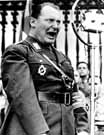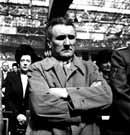
|
|
|

|

|

|

|
|
Click on an image to see a larger, more detailed picture.
|
|
|
|
|
| 1944: Desperate Acts |

|
pg. 523 |

|
|
|
|
| |
 Men and women of the Polish Resistance share a moment of camaraderie before returning to the fight. Using guerrilla tactics, these fighters aided the Russian Army by harrassing German troops in the area of Vilna, Lithuania. Some Jews, operating from the Rudninkai Forest and other secret locations, participated in the Resistance, preparing the way for the liberation of Vilna in July.
Men and women of the Polish Resistance share a moment of camaraderie before returning to the fight. Using guerrilla tactics, these fighters aided the Russian Army by harrassing German troops in the area of Vilna, Lithuania. Some Jews, operating from the Rudninkai Forest and other secret locations, participated in the Resistance, preparing the way for the liberation of Vilna in July.
Photo: Corbis-Bettmann
|
 Hermann Göring had been among the most influential figures in Nazi Germany, but by 1944 he was hopelessly addicted to heroin and his influence was on the decline. He had also ballooned to over 300 pounds. Hitler, who blamed Göring for the war turning against Germany, often refused to even meet with him. Most of his earlier clout had been lost to Joseph Goebbels, Heinrich Himmler, and Martin Bormann.
Hermann Göring had been among the most influential figures in Nazi Germany, but by 1944 he was hopelessly addicted to heroin and his influence was on the decline. He had also ballooned to over 300 pounds. Hitler, who blamed Göring for the war turning against Germany, often refused to even meet with him. Most of his earlier clout had been lost to Joseph Goebbels, Heinrich Himmler, and Martin Bormann.
Photo: Hulton Getty Images
|
 Joseph Darnand was a veteran of World War I and had long been associated with right-wing antisemitic groups in France. He founded the Service d'ordre légionnaire (SOL), a collaborationist paramilitary group with about 15,000 members. Darnand eventually became leader of the militia in Vichy France, and hence was in charge of maintaining law and order there. Here he is shown at an April 16, 1944, rally in Paris designed to encourage collaboration among the city's population.
Joseph Darnand was a veteran of World War I and had long been associated with right-wing antisemitic groups in France. He founded the Service d'ordre légionnaire (SOL), a collaborationist paramilitary group with about 15,000 members. Darnand eventually became leader of the militia in Vichy France, and hence was in charge of maintaining law and order there. Here he is shown at an April 16, 1944, rally in Paris designed to encourage collaboration among the city's population.
Photo: Zucca/Bibliothņque Historique de la Ville de Paris
|
|

|

|

|

|
 April 20, 1944: Twenty-nine Jewish slave laborers left behind after a partially successful escape from Ponary, Lithuania, are shot by SS overseers.
April 20, 1944: Twenty-nine Jewish slave laborers left behind after a partially successful escape from Ponary, Lithuania, are shot by SS overseers.
|
 April 22, 1944: Fifty children are among 250 Jews and Soviet POWs laboring at a Siemens Schuckert electrical-instruments plant at Bobrek, Poland.
April 22, 1944: Fifty children are among 250 Jews and Soviet POWs laboring at a Siemens Schuckert electrical-instruments plant at Bobrek, Poland.
|
 April 28, 1944: Adolf Eichmann dispatches the first 1500 Jewish slave laborers from Hungary to arms factories in and near Auschwitz.
April 28, 1944: Adolf Eichmann dispatches the first 1500 Jewish slave laborers from Hungary to arms factories in and near Auschwitz.
|
 April 29, 1944: The first deportation of Hungarian Jews to Auschwitz occurs at Kistarcsa.
April 29, 1944: The first deportation of Hungarian Jews to Auschwitz occurs at Kistarcsa.
|
 April 29, 1944: 1004 Jews are deported from the Drancy, France, transit camp to Auschwitz, including Yiddish poet Itzhak Katzenelson and his eldest son.
April 29, 1944: 1004 Jews are deported from the Drancy, France, transit camp to Auschwitz, including Yiddish poet Itzhak Katzenelson and his eldest son.
|
 April 30, 1944: Two thousand able-bodied Jews are deported from Topolya, Hungary, to Auschwitz.
April 30, 1944: Two thousand able-bodied Jews are deported from Topolya, Hungary, to Auschwitz.
|
 May 1944: Christian Wirth, SS-Sturmbannführer and commandant of the Belzec, Poland, death camp, is assassinated by partisans in Fiume, Yugoslavia.
May 1944: Christian Wirth, SS-Sturmbannführer and commandant of the Belzec, Poland, death camp, is assassinated by partisans in Fiume, Yugoslavia.
|
|
|
|
|
| 1944: Desperate Acts |

|
pg. 523 |

|
|
The Holocaust Chronicle
© 2009 Publications International, Ltd.
|
|
